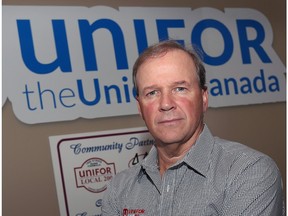New Trump auto tariff threats add to uncertainty at Windsor Assembly

Article content
Unifor Local 444 president James Stewart said U.S. President Donald Trump’s latest threats to raise American tariffs on Canadian-built vehicles even higher is only further stoking the fires of uncertainty in an industry that’s struggling to even schedule shifts beyond a week’s notice.
Stewart added the only certainty is the auto industry is going to see less production in the coming months.
Recommended Videos
“The company has said to us they expect changes to production in the coming months just based on the uncertainty around the industry and these tariffs,” Stewart said of expected lower volumes.
“We know it’s this week and next week (for production) and they said they’d get to us with new information as soon as they can. They’re continuing to assess the tariff situation.
“I imagine Ford, GM, Toyota and Honda are all doing the same thing.”
More than 4,000 employees at Windsor Assembly Plant returned to work Tuesday after being on lay off for the previous two weeks. That had a cascading effect through the Windsor automotive supply community with Windsor Assembly’s five main feeder plants also being idled for the same period.
Unifor Local 200 president John D’Agnolo confirmed Ford’s Essex and Windsor Annex engine plants continue to operate as normal to supply the powerplants for the company’s most profitable vehicles – the F-series pickup truck lineup.
Stewart said Stellantis has been very open to discussions on the tariff issue, but hasn’t revealed much about the company’s long-term plans.
“They’ve been tight-lipped on their plans, but we talk with them on a regular basis,” Stewart said.
“To be honest, I don’t think they know yet (their long-term plans) because they don’t have the information they need to make decisions. Trump changes so much I don’t know how he can think this is good for the globally economy.
“He’s purposely destroying the economy.”
Stewart said Trump’s threat to raise tariffs on imported cars beyond 25 per cent doesn’t represent any change from his previously stated rhetoric around wiping out the Canadian auto industry and making Canada the 51st state.
“He’s quieted down in recent weeks, but the rhetoric hasn’t changed,” Stewart said. “He wants to move jobs to the U.S. that he claims are stolen.
“It’s a ridiculous claim. As of today, Stellantis has two active shifts in Canada.
“Ford has the two local engine plants, but it isn’t even building a car in Canada currently. GM has three shifts at its Oshawa truck plant, so there are only five active shifts building vehicles for the Detroit Three.”
In 2024, the five automakers located in Ontario, which includes Toyota and Honda, built 1.3 million vehicles while Canadians bought 1.86 million new vehicles. More than 700,000 of those new products were built by American automakers.
“He’s hurting American companies because he claims we’re stealing U.S. jobs,” D’Agnolo said.
“Ford has 26 plants in the U.S. and I have three here in Canada. That doesn’t sound like we’re invading the U.S.”

D’Agnolo note Canada is the largest market for American automakers outside the U.S. He added the Detroit Three are also keenly aware what the impact would be on sales if they pulled production south of the border.
“It’s pretty arrogant (of the Trump administration) to think we’ll move production to the U.S. and still expect Canadians to buy American cars,” D’Agnolo said.
“If they think Canadians will buy their cars, that’s not happening.
“When GM closed the Oshawa plant, they were leading Canada in car sales. Their sales slipped to fourth or fifth.”
D’Agnolo added the next seven to 10 days will be critical for the industry with Trump deciding whether to go forward with his plan to start imposing tariffs on non-American auto parts. Currently, there’s a pause on those tariffs for all parts that meet the domestic criteria under CUSMA.
The Trump administration is expected to release details on its parts tariffs plan May 3.
“In the next week, if he tariffs parts, the auto industry will begin layoffs,” D’Agnolo said.
“The next week is also important because Canada will have a prime minister after the election. He’ll have to make calls and changes and not put up with just what Trump says.
“It isn’t going to be as quiet as it has been once the election is done.”
As part of the effort to create some noise to draw attention to the industry,
Unifor is holding a Protect Canadian Jobs Rally on Saturday, April 26 at 1 p.m. at Riverfront Festival Plaza in Windsor, Ontario.
“Trump wants to take our entire auto industry without consequence,” said Unifor national president Lana Payne.
“But here’s the truth: Canadians buy more vehicles than we produce. If automakers want to sell here, they have to build here too. That’s how a fair system works.”
Dwaddell@postmedia.com
Twitter.com/@winstarwaddell











Postmedia is committed to maintaining a lively but civil forum for discussion. Please keep comments relevant and respectful. Comments may take up to an hour to appear on the site. You will receive an email if there is a reply to your comment, an update to a thread you follow or if a user you follow comments. Visit our Community Guidelines for more information.